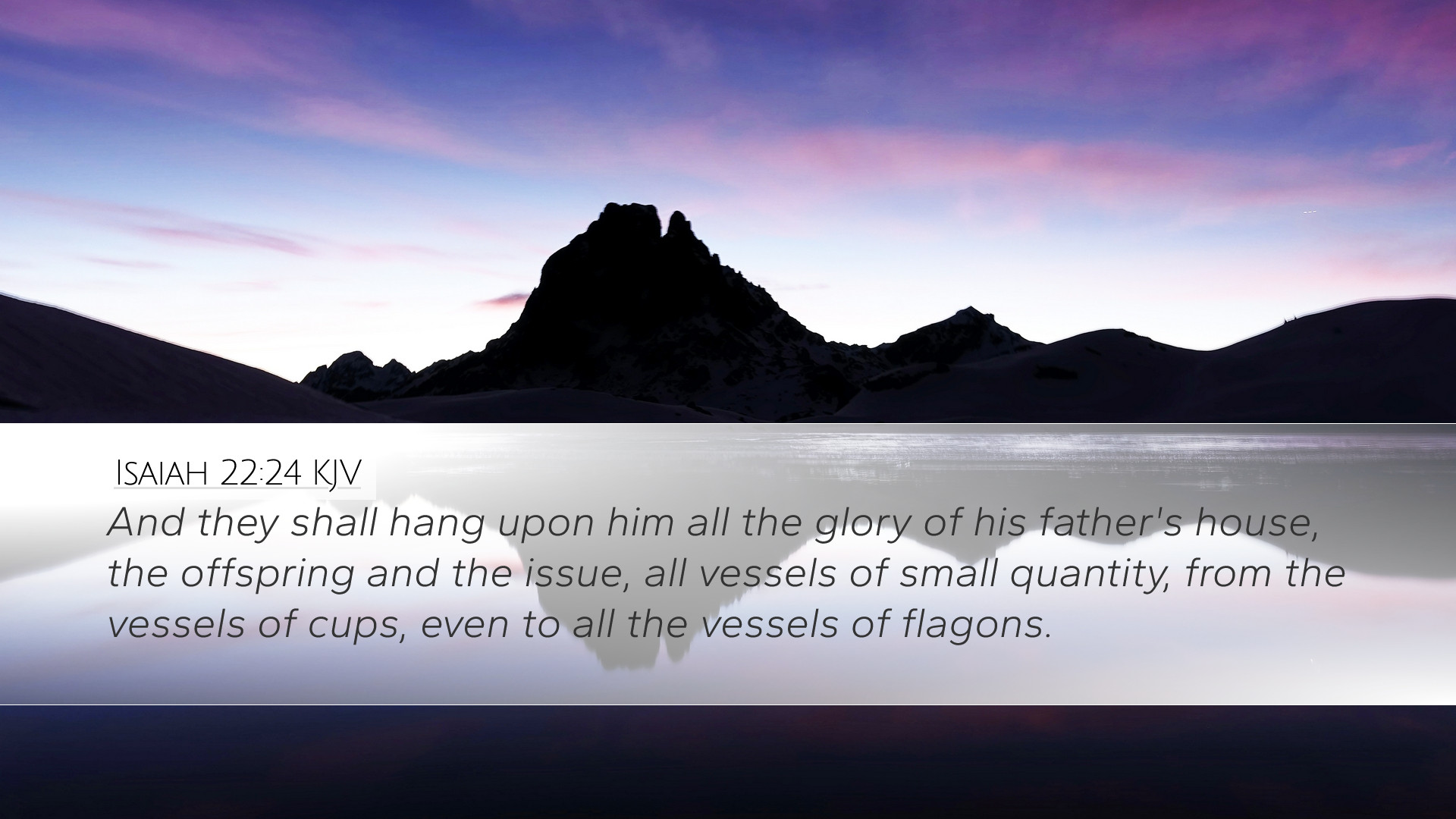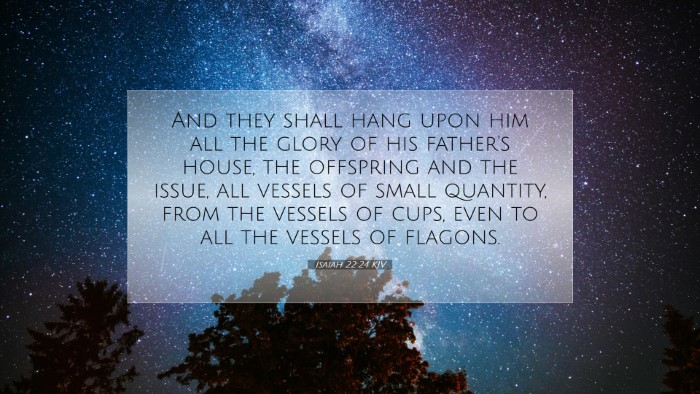Commentary on Isaiah 22:24
Isaiah 22:24 states:
"And they shall hang upon him all the glory of his father's house, the offspring and the issue, all vessels of small quantity, from the vessels of cups, even to all the vessels of flagons."
This verse is set within a larger context that speaks profoundly to themes of responsibility, leadership, and divine judgment. Let's explore insights drawn from various public domain commentaries.
Contextual Background
Isaiah 22 is often interpreted as a prophecy concerning the city of Jerusalem and its leaders. The chapter warns of impending judgment due to their unfaithfulness and prescribes a future hope in God's continued leadership amidst sin and failure. Matthew Henry emphasizes the need for spiritual vigilance among leaders, while Albert Barnes highlights the role of Eliakim, appointed as a key leader in a time of crisis.
Key Themes
- Leadership Responsibility: The metaphor of hanging the glory of the house upon Eliakim signifies the weight of leadership. Clarke notes that leaders are tasked with the stewardship of God's people, bearing the honor and trust that comes with absolute responsibility.
- Divine Judgment and Mercy: This verse serves as a dual reminder of God's judgment on unfaithfulness and His mercy in providing a faithful steward as seen in Eliakim. Barnes elucidates how the implication is that much is demanded from those who are entrusted with more.
- Symbolism of Vessels: The mention of vessels varies in size and quantity, echoing the roles of different people in the community. Henry observes that these vessels symbolize the diverse responsibilities within the body of Christ, each person contributing to the glory of God’s house.
Commentary Insights
Matthew Henry
Matthew Henry notes that the phrase “they shall hang upon him” conveys a strong sense of dependency. Eliakim is depicted not merely as a figure of authority but as one upon whom the well-being of others relies. This relationship intimates how spiritual leaders are to be reflections of Christ, exhibiting qualities of service, humility, and strength.
Albert Barnes
Barnes elaborates that the “glory of his father’s house” represents not just honor but also the legacy handed down through generations. He indicates that Eliakim's leadership aligns with God’s purpose for restoration and community well-being in Jerusalem. Through this lens, the verse foreshadows the significance of Christ as the ultimate steward, carrying forward the legacy of divine grace.
Adam Clarke
Clarke emphasizes the figurative language used—vessels embody not only physical items but also represent the people they symbolize. He connects the imagery of vessels to the varied roles believers hold in the community of faith. Clarke encourages readers to see themselves as vessels in God’s house, tasked with the glory of their Creator.
Theological Reflections
This verse calls pastors, theologians, and scholars to reflect on the depth of God’s expectations for leaders within the church today.
- The Nature of Glory: What does it mean to carry the “glory” of God? This inquiry leads to an understanding that glory in a spiritual context is closely tied to obedience and faithfulness in leadership.
- Community as Vessels: In what ways can modern congregations embody the reality of being vessels of the Lord today? Emphasizing collective good, spiritual growth, and mission fulfillment is essential for the body of Christ.
Practical Applications
For pastors and church leaders, the application of Isaiah 22:24 lies in recognizing the weight of leadership and the accountability of representing God's glory. Here are a few practical steps:
- Embrace Humility: Like Eliakim, leaders must approach their role with humility, acknowledging that their calling is to serve rather than to wield authority.
- Encourage Unity: Foster an environment where every member feels valued, emphasizing that each is a vessel contributing to the collective glory.
- Teach Responsibility: Enable church members to understand their roles within the body, empowering them to take ownership of their spiritual journeys and responsibilities.
Conclusion
Isaiah 22:24 serves as a profound reminder of the weight of glory and responsibility placed upon leaders within the church. Through a careful examination of public domain commentaries, we find richness in understanding the scriptures in historical, cultural, and theological contexts. The call to leadership is not only a privilege but a divine mandate to carry forth the mission of God with integrity and accountability.


